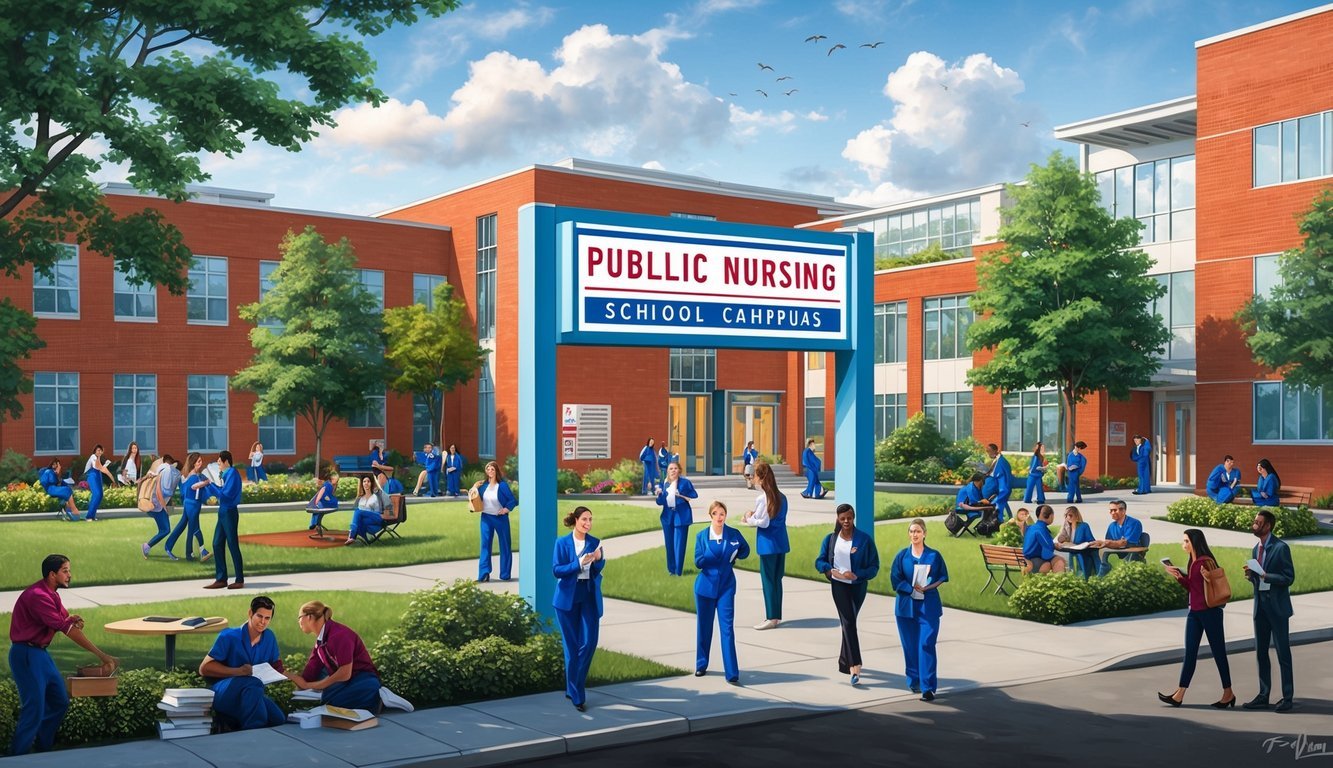Finding a nursing school that fits your needs is an important step in your path to becoming a registered nurse.
Many local public nursing schools offer quality programs that provide the education and hands-on experience needed for this fulfilling career. This article will help you discover public nursing schools near you, including their admission requirements and how to finance your education.
You might be wondering what types of nursing programs are available in your area and how to choose the right one.
Each school has unique features, but they all aim to prepare you for the challenges of the nursing field.
You will also learn about accreditation, which ensures that your education meets specific standards and enhances your career prospects.
As you explore your options, understanding the various pathways to becoming a nurse is essential.
Compiling this information can lead you to a rewarding career in healthcare.
Key Takeaways
- Explore local public nursing schools and their programs.
- Understand admission requirements and financing options.
- Learn the importance of accreditation for your nursing education.
Exploring Nursing Education Paths
Nursing education offers various pathways to help you achieve your career goals.
Understanding these options is vital in selecting the program that best fits your needs and aspirations.
Below are detailed descriptions of key nursing education paths available to aspiring nurses.
Bachelor of Science in Nursing (BSN) Programs
A Bachelor of Science in Nursing (BSN) is a widely recognized degree that prepares you for a professional nursing career.
Most BSN programs take about four years to complete and include both classroom instruction and clinical practice.
BSN graduates are often preferred by employers due to their comprehensive training, which covers patient care, health assessment, and nursing leadership.
With a BSN, you can take the NCLEX-RN exam to become a registered nurse.
Many schools, such as those listed on Nursing Schools Almanac, offer quality BSN programs tailored to meet state and national standards.
Associate Degree in Nursing (ADN) Programs
The Associate Degree in Nursing (ADN) is typically a two-year program offered at community colleges and some universities.
This program focuses on the fundamentals of nursing, providing a balance of theoretical knowledge and practical skills.
ADN programs are an excellent choice if you’re looking to enter the nursing workforce quickly.
Graduates can sit for the NCLEX-RN exam, allowing them to become registered nurses.
Many ADN programs feature partnerships with healthcare facilities, which can help streamline your clinical training and job placement.
Direct-Entry BSN Programs
Direct-Entry BSN programs cater to individuals who already hold a bachelor’s degree in another field.
These programs typically last 12 to 18 months and are intense, designed to cover nursing theory and clinical practices rapidly.
This option is ideal if you seek a career change and wish to become a registered nurse in a shorter timeframe.
You will receive a full nursing education while building on your previous academic experience, making you an appealing candidate for employers.
Schools offering direct-entry BSN options often emphasize hands-on learning experiences and may have partnerships with local hospitals.
Accelerated BSN Programs
Accelerated BSN programs are designed for individuals who hold a non-nursing bachelor’s degree and want to transition into nursing quickly.
These programs can be completed in 12 to 18 months, depending on the school.
The curriculum is rigorous, focusing on essential nursing skills and knowledge while providing extensive clinical practice.
Due to the fast pace, you will need strong time management and study skills.
Graduates are eligible to take the NCLEX-RN exam, much like traditional BSN graduates.
Many nursing schools provide valuable resources and job placement assistance, enhancing your career prospects after graduation.
Admission Requirements and Process

Understanding admission requirements is crucial for your journey toward becoming a nurse.
This section outlines the necessary steps and documents you need to prepare for nursing school applications.
Undergraduate Nursing Program Prerequisites
Before applying to an undergraduate nursing program, you must meet specific academic requirements.
Common prerequisites include:
- High School Diploma or GED: A diploma or General Educational Development (GED) certificate is essential to apply.
- GPA Requirements: Most schools expect a minimum GPA of 2.5 to 3.5, depending on the program’s competitiveness.
- CPR Certification: Many programs require current CPR certification, ensuring you know essential life-saving techniques.
- Physical Examination: A health check-up may be mandated to confirm you meet physical standards for nursing.
Each school may have additional requirements, so review the admissions information for the specific nursing program you are interested in.
Documentation and Background Checks
When applying, you’ll need to submit various documents and undergo background checks:
- Official Transcripts: Provide high school or GED transcripts and any college credit if applicable.
- Criminal Background Check: Most nursing programs require a criminal history check. A clean record is important because it can affect your eligibility for clinical placements.
- Drug Screening: Be prepared for potential drug tests, as many schools implement this step to ensure student safety.
Ensure all documents are submitted by the deadline, and check with Nursing Schools Almanac for additional details about specific programs.
Financing Your Nursing Education

Paying for your nursing education can be a significant concern.
Understanding tuition costs and exploring financial aid options will help you create a plan that fits your budget.
Understanding Tuition and Fees
Tuition for nursing programs varies by school and state.
Public nursing schools typically offer lower rates than private institutions.
For example, an in-state nursing program may cost around $78,192 for four years.
In contrast, out-of-state programs could reach approximately $136,124.
Here’s a quick look at average costs:
| Program Type | Average Cost |
|---|---|
| In-State Public | ~$78,192 |
| Out-of-State Public | ~$136,124 |
| Private Institutions | $72,000 – $104,000 (varies) |
In addition to tuition, you should consider other fees, such as room and board, textbooks, and lab costs.
These can add thousands to your total expense.
Always check your chosen school’s website for specific figures.
Scholarships and Financial Aid Options
Many financial aid options exist to help you afford nursing school.
Scholarships, grants, and work-study programs can significantly reduce costs.
According to the American Association of Colleges of Nurses, most nursing school debt ranges from $25,000 to $55,000.
Here are some potential resources for financial aid:
- Federal Student Aid: Access information about federal loans and grants at studentaid.gov.
- Nursing Scholarships: Many organizations offer nursing-specific scholarships. Check with your desired school for available options.
- State Programs: Some states provide their own financial aid for nursing students. Research your state’s programs for additional funding.
By exploring these options, you can make nursing school more affordable and manageable.
Accreditation and Quality of Nursing Programs
Ensuring the quality of nursing education is crucial for your future career.
Accreditation is one way to check if a program meets high standards.
Additionally, reviewing NCLEX-RN pass rates can give you insight into how well students are prepared for the nursing exam.
The Importance of ACEN Accreditation
The Accreditation Commission for Education in Nursing (ACEN) plays a vital role in nursing education. ACEN accreditation means a program has met specific standards assessed by peer evaluators.
Accredited programs often provide better educational resources, experienced faculty, and structured curriculums.
This accreditation is important for your job prospects since many employers prefer candidates from accredited programs.
When choosing a nursing school, look for whether it holds ACEN accreditation.
You can find a list of accredited programs on the ACEN website at ACEN Accreditation.
Evaluating NCLEX-RN Pass Rates
NCLEX-RN pass rates are another important metric to consider.
These rates indicate how many graduates successfully pass the nursing licensure exam on their first try.
High pass rates often suggest that a program effectively prepares students for the real-world demands of nursing.
To evaluate a program’s effectiveness, compare its NCLEX-RN pass rates to state and national averages.
You can usually find this information on school websites or through state nursing boards.
Here’s a brief example of how to assess these rates:
| School Name | NCLEX-RN Pass Rate | State Average Pass Rate |
|---|---|---|
| School A | 95% | 87% |
| School B | 78% | 87% |
High pass rates may reflect strong faculty support, comprehensive curricula, and access to clinical experiences.
These factors contribute to your readiness for a successful nursing career.
Career Advancement and Higher Education

Pursuing higher education is essential for career advancement in nursing.
By advancing your education, you can develop leadership skills, gain professional development, and open up new opportunities in nursing care.
From RN to BSN: Advancing Your Education
Transitioning from a Registered Nurse (RN) to a Bachelor of Science in Nursing (BSN) is a significant step in advancing your career.
Many hospitals and employers prefer or require a BSN for leadership and specialized positions.
RN to BSN programs are designed for working nurses.
They typically take 12 to 24 months to complete, offering flexible online formats.
Coursework often includes subjects like nursing research, healthcare policy, and community health.
These programs enhance your critical thinking and problem-solving skills, which are crucial in modern healthcare.
Additionally, obtaining a BSN can lead to better job prospects and higher salaries.
According to research, BSN holders earn significantly more than those with only an associate degree.
Consider programs at institutions like the American Association of Colleges of Nursing.
Graduate Nursing Programs: DNP and Ph.D.
For those aiming for the highest levels of nursing practice or academia, pursuing a Doctor of Nursing Practice (DNP) or a Ph.D. is essential.
Both paths cater to different career goals.
A DNP program focuses on advanced clinical practice, leadership, and policy-making in healthcare.
It’s ideal for nurses who want to enhance their clinical skills and take on leadership roles.
DNP graduates often work in administrative positions, consulting, or specialized clinical roles.
In contrast, a Ph.D. program centers on research and education.
This path is suitable for those interested in teaching at universities or conducting nursing research.
Ph.D. graduates contribute to nursing science and policy development.
Both programs generally require a master’s degree and take three to five years to complete.
Check programs accredited by recognized bodies, like the Commission on Collegiate Nursing Education.
Local Nursing Schools and Programs Overview
When looking for local nursing schools, you have several options to consider.
Here’s a brief overview of some notable institutions offering nursing programs:
| School Name | Location | Program Type |
|---|---|---|
| University of North Carolina | Multiple campuses in NC | Bachelor of Science in Nursing (BSN) |
| Chamberlain University | Various campuses nationwide | Bachelor of Science in Nursing (BSN) |
University of North Carolina provides a comprehensive nursing program that prepares you for the Registered Nurse (RN) licensure.
The program emphasizes clinical practice and patient care.
Chamberlain University offers an accelerated BSN program for students who want to complete their nursing education quickly.
Their focus is on hands-on training and real-world experience.
Both schools are well-known for their quality education and respected programs.
You may also want to check local community colleges.
Many offer Associate Degree in Nursing (ADN) programs, which can be a quicker path to becoming an RN.
Choosing the right nursing school is essential for your future career.
Explore each institution’s website to learn more about their specific offerings and admission requirements.
Frequently Asked Questions

This section provides clear answers to common questions about public nursing schools.
Understanding admission requirements, accreditation, and program duration can help you navigate your educational choices effectively.
What are the admission requirements for public nursing schools?
Admission requirements can vary by school.
Generally, you may need to submit your high school transcripts, take standardized tests, and provide letters of recommendation.
Some programs may also require a personal statement or an interview.
Which public nursing schools offer accredited programs?
To find accredited nursing programs, look for schools recognized by organizations such as the Commission on Collegiate Nursing Education (CCNE) or the Accreditation Commission for Education in Nursing (ACEN).
You can check specific schools through their websites or Nursing Schools Almanac.
Are there any public nursing schools that provide free education?
While completely free public nursing programs are rare, some schools offer significant financial aid or scholarships.
Community colleges may have lower tuition fees and various funding options to reduce costs.
How can I find the best-rated public nursing schools in my area?
To locate top-rated public nursing schools, consider checking rankings and reviews on websites like RegisteredNursing.org or Nursing Schools Almanac.
You can also ask current students or healthcare professionals for recommendations.
What is the typical GPA requirement for entrance into a nursing program?
Most public nursing schools look for a GPA of 2.5 to 3.5 on a 4.0 scale.
Specific requirements can differ, so it is essential to check with each school’s admissions office for their exact standards.
How long does it typically take to complete a nursing program at a public institution?
An associate degree in nursing (ADN) usually takes about two years.
Meanwhile, a bachelor’s degree (BSN) can take four years.
Some accelerated programs might allow you to finish faster, depending on your prior education and course load.

